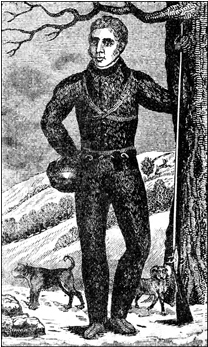
Hero of Camping: Estwick Evans
The Craziest Thru Hiker of the Early Nineteenth Century
Estwick Evans, an eccentric, bored, apparently burned-out New Hampshire lawyer, made headlines and caused consternation when he embarked on a borderline-suicidal four-thousand-mile “pedestrious” tour of America, starting with a seven hundred forty-four mile walk from New Hampshire into the western territories. Evans was trying to simplify his life and discover the essence of himself, thirty-five years before Walden came out. He embarked on America’s ultimate thru hike adventure, a century and a half before Congress passed the National Trails System act of 1968, giving “national scenic trail” status to the Appalachian and Pacific Crest Trails.
The wind threw snowdrifts in Estwick Evans’s face as he trudged away from his home in mid-February 1818 while dressed in thick robes of buffalo skin with bearskin trim and homemade moccasins on his feet. He loved the wilderness, but this was a time when most people found the forests terrifying. Evans took no chances. His camping gear included “a brace of pistols”; a long, thrusting dagger called a “dirk”; a small but lethal hatchet; and a six-foot rifle. If he happened upon some meager lodging, he would sleep on the bare floor with his hunting dogs Pomp and Tyger cuddled against him. On most nights, though, he took his rest in a tent, which he set up even in storms. Some people in town thought his camping tour was incomprehensible. “Some imagined me to be on a secret expedition for the government,” he noted. Like Thoreau after him, Evans, who was antislavery, saw a link between camping and self-emancipation. As he walked across the country, the treatment of slaves struck him as a blight on the American soul. “Oh, cruel nation!” he wrote in his memoir. “Loh, detestable system! The oppressor is hateful to the eye of Heaven.”

Estwick Evans, 1787–1866
Evans was no lunatic. He was just a well-read, privileged gentleman who could afford to entertain romantic ideas about camping out. Like modern-day campers who revel in going out there and getting their noses cold for a while and then rushing back to their houses, Evans set out to experience “the pleasure of suffering and the novelty of danger.” Giant flocks of geese rocketed over his head. Ancient forests rose above him. He waded through saline springs, squeezed through “gloomy” caverns, and stared for hours at “torpid” bats. He was woefully out of shape, his feet swelled up, and at one point he nearly froze to death. Near the dreaded Great Black Swamp of Ohio, a hungry wolf pack surrounded poor Pomp and Tyger, ripped them to pieces, and devoured them while Evans lay moaning in his tent, driven half mad by an “excruciating tooth ache,” which temporarily deprived him, puzzlingly, of most of his sense of hearing. He had every reason to finish his campout in a bitter or mopey frame of mind. Instead, he returned full of rapture.
In all, he lugged forty pounds of pack weight “through deep snows and bogs and over many a tedious mountain.” When asked why he would have done such a silly, treacherous thing, Evans said, “I wished to acquire the simplicity, native feelings and virtues of savage life … and to become a citizen of the world.… How great are the advantages of solitude!”